Topics:
Never Miss a Beat - Get Updates Direct to Your Inbox
FILTER:


What Is Seller Financing and How Can It Help You Buy or Sell a Business?
By Quiet Light
There are several different ways to structure a business acquisition deal, and seller financing is one element that many buyers look for. Not only does seller financing provide buyers with greater leverage, but it also instills confidence because it shows that the seller believes strongly in the future of the business.
While deals that include seller financing offer many benefits for buyers, they also carry significant responsibility. Although businesses often have enormous growth potential, carrying a significant debt shouldn’t be taken lightly.


There are a few common questions we hear from buyers and sellers who are considering seller financing.
What happens if someone buys a business but can no longer make the payments that are due? What options does a seller have if a default occurs? As a buyer, what are the risks involved in seller financing?
Of course, it’s best when these questions are addressed in hypothetical terms. In other words, it’s important to think about the potential benefits and consequences of seller financing before you enter into such a deal.
This post will cover all of the most important questions to consider regarding deals that involve seller financing. In the following sections, we’ll discuss:
- Why buyers love seller financing.
- Why sellers often refuse owner financing.
- A case study of a seller who’s buyer defaulted on the promissory note.
- What options sellers have if a buyer defaults.
- How to craft an owner financing offer the works for both parties.
Seller Financing Makes a Lot Of Sense For Buyers
First of all, let’s address the most basic question: What is seller financing?
Seller financing is a deal structure in which the buyer isn’t required to pay the full purchase price at closing. In such deals, the buyer typically pays a down payment at the time of closing, and then makes monthly payments for a specified period of time until the purchase price has been paid in full.
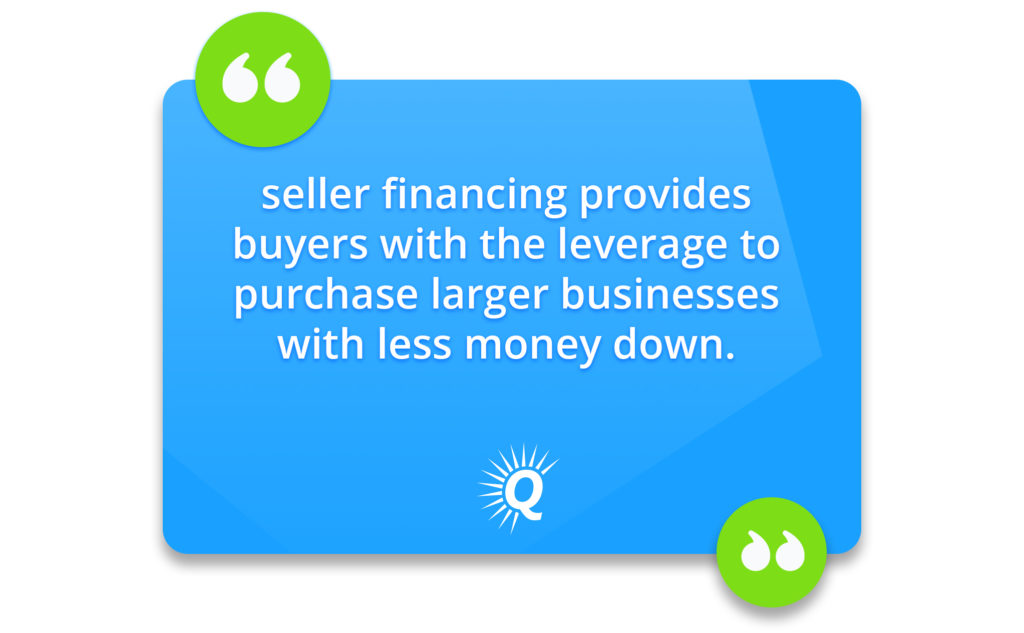

It’s no secret that buyers love seller financing. From a buyer’s perspective, there are three primary benefits of such deals.
- Buyers are required to invest less capital up front.
- Seller financing usually implies that the seller feels confident in the
- business’s future, which instills trust in buyers.
- Seller’s are incentivised to provide a smooth transition and support the new owner.
As the name implies, seller financing requires buyers to invest less capital up front. Since businesses (presumably) earn income, they can literally pay for themselves over time after investing a relatively small down payment. Also, unlike SBA loans, seller financing deals don’t need to satisfy SBA loan requirements.
Essentially, seller financing provides buyers with the leverage to purchase larger businesses with less money down.


For example, let’s say a buyer has $60,000 to invest in a business acquisition. Without seller financing (or other financing such as bank financing or an sba loan), this buyer is only able to purchase a business that is worth $60,000. If the business is valued at a 3X multiple, such a business only earns $20,000 per year or $1,667 per month.
On other hand, if the same buyer is able to secure a deal that is 80% seller financed and only requires a 20% down payment, they’re suddenly able to afford a business that is worth $300,000 while still only investing $60,000 at closing (a 20% down payment of $300,000 = $60,000).
Thinking of Selling Your Business?
Get a free, individually-tailored valuation and business-readiness assessment. Sell when you're ready. Not a minute before.
Assuming that the second business is also valued at a 3X multiple, the buyer is now bringing in $100,000 per year or $8,333 per month. Of course, part of that income will be dedicated to making the agreed monthly payment to the former business owner, but overall, the buyer will still wind up with a more valuable business that is earning more revenue and profit. In some ways (not all), these deals resemble those involved in real estate lending.
Secondly, when seller financing is involved, sellers are more invested in the future success of the business since they know that the buyer’s ability to pay is likely dependent on its profitability. This provides buyers with added confidence and trust—if the seller believes strongly in the business, why shouldn’t they?
Additionally, seller financing ensures that the seller has a strong incentive to provide a smooth transition and support the buyer so they can be successful. While it’s ultimately the new owner’s responsibility to run and grow the business, knowing that the seller is still invested can go a long way to instilling confidence and helping it succeed.
Sellers Often Hate Seller Financing
As much as buyers love finding ecommerce businesses for sale that offer owner financing, sellers often despise such deals.
Andrew Youderain, founder of E-commerce Fuel, wrote an extensive blog post about selling an e-commerce business in which he touched on seller financing:
“I’m not going to mince words here: I hate owner financing.
For me, selling my businesses in the past partially came down to avoiding risk. I’m choosing to sell a cash flow at a 3x(ish) multiple to lock in those gains and avoid the chance the business tanks over time. So why in the world would I finance a purchase for the buyer and assume MORE risk? As a seller, you’re assuming all downside risk (apart from any interest) without any of the upside of ownership. No, thank you.”
Andrew’s thoughts on owner financing echo those of many sellers.


If a seller is going to consider entering a deal involving owner financing, they’ll typically want to consider three important questions:
- How can a seller know that a buyer is trustworthy?
- How can a seller enforce seller financing?
- What collateral can a seller require from a buyer?
Let’s start with the first.
How can a seller know that a buyer is trustworthy?
For both parties, entering into a seller financing agreement isn’t a minor decision. Although the seller does have some recourse available to them if the deal goes awry, they are still entrusting a new person to care for a valuable asset which they’re still invested in.
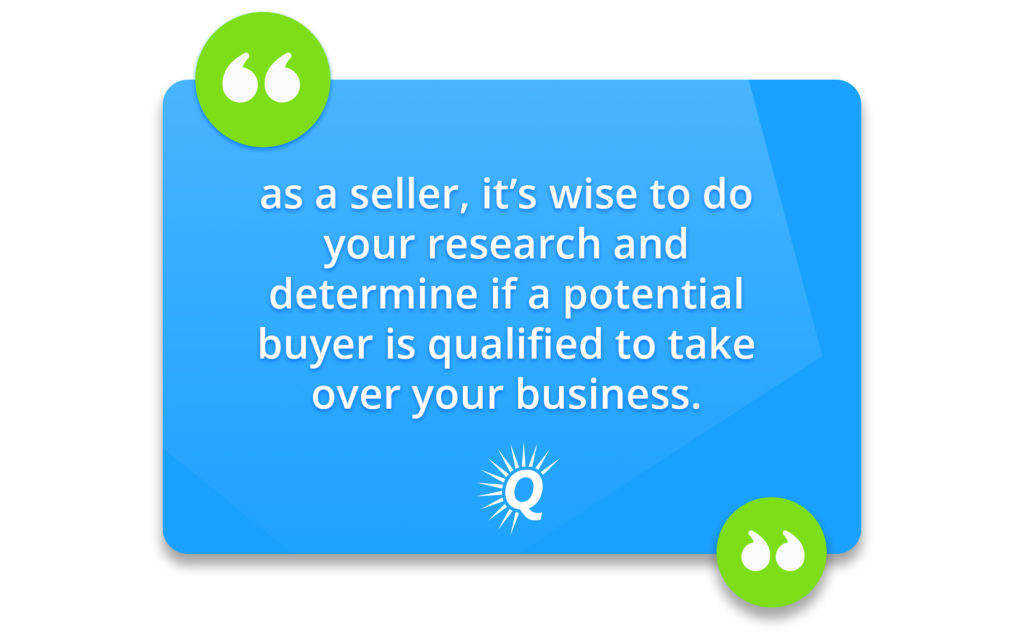

Like most commitments, there are two crucial questions that a seller should be able to answer about the potential buyer:
- Is the potential buyer competent to run this business?
- Will the potential buyer uphold their commitment to make their future payments?
As mentioned above, a buyer’s ability to make their monthly payments is often dependent on the continued profitability of the business under their control. In other words, the new owner is likely relying on the business’s income to pay the seller.
Therefore, it’s important that the new owner is competent to run the business and maintain its profitability. This means, as a seller, it’s wise to do your research and determine if a potential buyer is qualified to take over your business.
For example, if you’re selling an Amazon business, it might be prudent to ask the buyer about their previous experiences and success selling on Amazon. Perhaps, it would even be smart to check their references, their Amazon accounts, and quiz them on the strategies they would use to ensure the continued profitability of the business you’re selling.
Buy a Profitable Online Business
Outsmart the startup game and check out our listings. You can request a summary on any business without any further obligation.
If it becomes clear that the prospective buyer doesn’t know what they’re doing, it’s probably a good idea to not sell to them, even if they’re willing to buy. Of course, it might be difficult to turn down an offer that meets your financial goals, but having the buyer run your business into the ground and default on the promissory note would obviously be significantly more challenging.
In addition to researching their competence, it’s also important to determine if the potential buyer is a trustworthy person and will uphold their commitment to complete each monthly payment based on the purchase price and interest rate agreed upon.
As mentioned, sellers do have recourse available to them if a buyer stops paying, but it’s obviously far preferable to avoid such incidents in the first place. Sellers have different methods for determining the trustworthiness of buyers—credits checks, speaking with references, and “personal feel” can all be involved in the research process.
How can a seller enforce seller financing?
The first thought most owners have when they see an offer that includes a seller note is, “how am I going to enforce the payments on this note if the buyer stops paying?” As one owner told us, “I’m not a bank, and I don’t want to pretend to be one.”
Collecting on a defaulted buyer is pretty much a guaranteed headache (as we’ll get into later). It’s time consuming, stressful, and potentially expensive. A seller who accepts financing on their business must ultimately trust they won’t have to fight that battle, or be willing to fight it if needed.
The good news is that it’s not difficult to create a clear and effective contract that can be upheld in a court of law. An agreement that specifies the terms of a deal including the buyer’s obligation to pay isn’t something that leaves a lot of room for various interpretations. By taking the right legal steps, many sellers are able to hold buyers accountable and recoup their losses when a default occurs.
Of course, there are some helpful ways to avoid a default in the first place (see below) and legal action should be seen as a last resort. Nonetheless, it’s important to know that the option exists.
Can an online business serve as collateral against a seller financing loan?
In real estate transactions, it’s common to collateralize the loan or mortgage with the property being sold. If the real estate buyer stops making payments, the lender can go after the value of the property that was sold. A conventional loan can also operate in a similar manner.
Unfortunately, an online business acquisition can’t be collateralized in the same way. There are two primary reasons for this:
- Most sellers don’t like the idea of having their business returned to them after the sale.
- The value of online businesses are often not as stable as real estate properties.
If an owner decides to sell, they typically won’t like the idea of reclaiming their former business if the buyer defaults on their loan. Presumably, the seller sold their business specifically so they’re no longer required to attend to its needs. Therefore, the idea of taking the business back isn’t exactly an appealing thought for most sellers.
Secondly, unlike real estate properties, online businesses are susceptible to rapid declines in value and profitability. Just because a business is valuable at the time it is sold, it doesn’t mean it will maintain its value after the new owner takes over.
Thinking of Selling Your Business?
Get a free, individually-tailored valuation and business-readiness assessment. Sell when you're ready. Not a minute before.
If a buyer begins to miss payments, the chances are that the business is suffering in some way. Since online businesses are valued based on their cash flow, the seller might have their loan secured with an asset that is quickly losing its value as the business continues to decline.
Does seller financing make sense for a seller?
For a seller, the points we’ve covered ultimately lead to one question: Does it even make sense for a seller to exchange their business for monthly payments?
If their business is currently profitable, it obviously means that they are already receiving income each month. Granted, there is work associated with these monthly payments, but they should continue in perpetuity.
With owner financing, a seller receives monthly payments for a limited period of time and then there is a guaranteed end date.
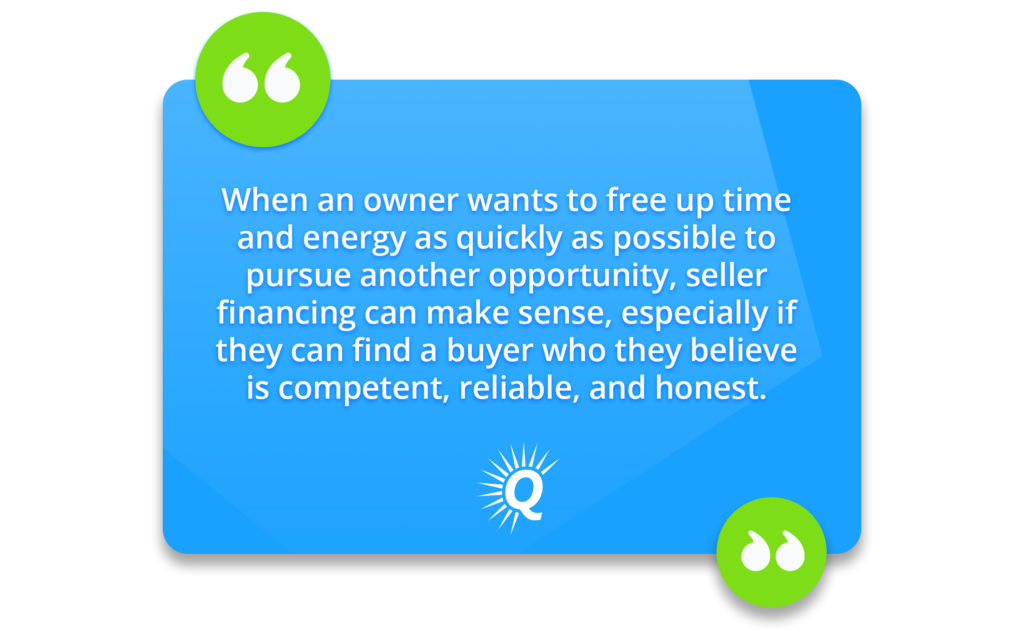

Based on this, seller financing isn’t very appealing to most owners. However, there are instances in which it can make sense.
If a business requires significant time or capital to run and the owner is facing other opportunities, there could be a strong incentive to sell the business as quickly as possible. When an owner wants to free up time and energy as quickly as possible to pursue another opportunity, seller financing can make sense, especially if they can find a buyer who they believe is competent, reliable, and honest.
Of course, each entrepreneur’s situation is different, so it’s impossible to make an absolute statement about whether seller financing is a good option for a given owner. However, the following statement applies to most people:
If an owner has a strong business and wants to guarantee that they’ll receive the full amount of the agreed purchase price in a timely manner, seller financing is probably not the best bet. However, if a seller has a distressed business, or if they want to sell as quickly as possible and they find a buyer whom they trust, seller financing can help them to achieve their exit goals.
A Case Study: What Corey Hammond of Brain Host did when his buyer stopped paying
As for many internet entrepreneurs, there came a time when Corey Hammond decided he wanted to sell his business.


Corey started Brain Host with several partners in 2010. After a few years of exponential growth ($0 to eight figures in just a couple of years), the partnership acquired FreeWebsite.com. Encouraged by the success of Brain Host, some of his partners believed that there was an enormous opportunity to develop FreeWebsite.com into a profitable freemium website builder service that leveraged the hosting infrastructure they had already built.
Corey wasn’t too impressed with his partners’ proposal. Not only did he believe it was a bad idea, but he also disapproved of the timing and manner in which his partners wanted to execute the new venture. He wanted the partnership to continue dedicating its resources to Brain Host, which he felt was a proven business model that could continue growing.
As it turned out, Corey was right. The partners pursued Freewebsite.com and it fell flat of their original expectations.
In Cory’s words:
“Free Website was supposed to launch in the spring, but it didn’t technically launch until the summer. It failed to sustain itself and we tried to pick up the pieces throughout June and July, but it was too late. It wasn’t going to do or produce what we had hoped it was going to produce.”
A partnership sours and Corey is bought out on a heavily financed deal
Rather than recognize FreeWebsite.com as a failed project, the partners fell victim to sunk cost bias (a topic which Mark Daoust wrote about in Forbes).
But Free Website didn’t have enough capital to dig itself out of its hole, so the partners continued to invest funds from Brain Host into their new ventures with the hopes that it would grow.
As the CEO of Brain Host, Corey was no longer willing to tolerate the situation. As Corry recalls, “Free Website essentially took my Brain Host team and cut it in half. My development team went from 5 people to 2. Half of those resources went to building Free Website, and half stayed on to run Brain Host.”
Buy a Profitable Online Business
Outsmart the startup game and check out our listings. You can request a summary on any business without any further obligation.
As a result, he became a more vocal advocate against Free Website.
Due to the disagreement, his partners bought out Corey’s shares in both Free Website and Brain Host.
Corey knew his options were limited: “I felt like I had very little choice and having it legally buttoned up and signed was my best course rather than fighting it, trying to stay, only to have them find other ways to dilute my shares.”
What Corey got was an offer he felt was undervalued and which disproportionately relied on seller financing.
What happens if a buyer defaults on payments? Here’s what happened In Corey’s situation
Sellers often hate owner financing because they don’t want to have to go through the process of collecting the debt if a buyer defaults on their payments after the sale.
For Corey, this fear became a reality just four months after he sold his shares. While the first three payments came in on time, the fourth payment never arrived. Three months later, Corey filed a lawsuit to collect his payments.
This was enough to bring his former partners to a quick settlement, pay back payments, and promise to resume payments as scheduled. But unfortunately, this didn’t happen.
Shortly after they resumed the contract, they told Corey that they were having trouble meeting his payments. He agreed to give them some extra time to make the next few payments, but those never materialized.


It wasn’t long before Corey was forced to file a second lawsuit—one which would be much uglier and more difficult than the first. Corey’s first lawsuit only succeeded in getting back payments, but not in establishing consequences for future defaults. Since he was quickly in the same position as before, he knew this lawsuit needed to demand more than just back payments.
His former partners also dug their heels in for the next six months as lawyer fees racked.
After six months, Corey and his former partners reached another settlement which included automatic judgments if they should default again.
Cory’s resolution
After their second settlement, the partners made good on Corey’s note. Corey watched the business from a distance and saw that it was struggling.
One day, the call came in from his former partners. Cory recalls the conversation:
“They came to me in May 2016. They called and asked to meet. At that meeting, they told me ‘The course has run out. There’s no more money to pay you, you can sue us again and we’ll just go into bankruptcy or we figure some elegant solution out.
That elegant solution was me acquiring back, not only Brain Host, but the main asset, FreeWebsite.com”
After 3+ years of lawsuits and settlements, Corey had his original business back, though bruised and neglected.
Sellers DO have options if a buyer defaults
If a seller’s main concern about accepting owner financing is whether they have options to collect on a defaulted loan, Corey’s story shows that a seller really does have some powerful options available to them if a buyer defaults.
With a well written purchase agreement, a seller has a very good chance at receiving a favorable judgement that forces the buyer to pay if they bring the issue to court. After all, if a person stops paying on an important promissory note that they have clearly agreed to, it’s pretty obvious who is in the right and who is in the wrong. Of all the
to have a thorough purchase agreement, the risk of default is perhaps the most important.
As Cory Hammond’s story shows, a buyer has a lot more they can potentially lose in a default.
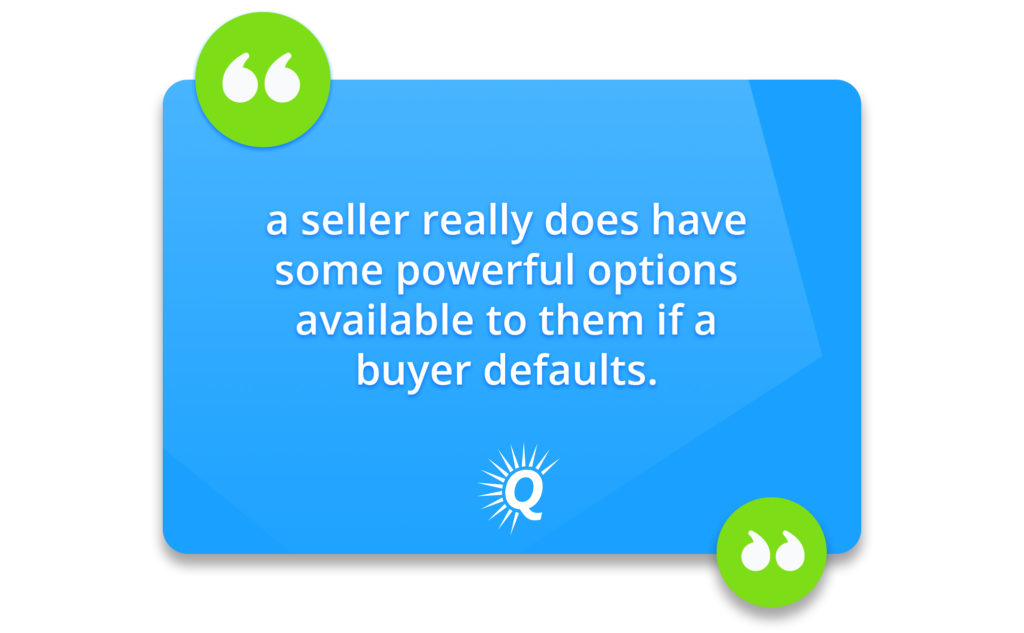

For the partners in Brain Host, they lost the money they invested in paying for Corey’s shares, the countless hours fighting a lawsuit they could never win, and even the asset they had previously bought.
However, this was only because Corey was willing to enforce the agreement, just as the SBA might in the case of an SBA loan default. For Corey, the impact of the lawsuits were severe. It affected his personal time, his friendships, his career, and every aspect of his life.
Receiving a judgement in court can require significant time, energy, and money in the form of lawyer fees, but it can certainly be worth it.
For Cory, he doesn’t regret what happened to him:
“The first lawsuit or the second lawsuit, yes, I would be very negative towards the whole thing. But I’m a big believer in things that happen, maybe not for a reason per se, but the sum of who I am is built on my experiences. I got a PhD in Business, Finance, and Law all wrapped up in a two-year, three-year period of time. Sure, it cost me more than a college education probably would have, but I wouldn’t trade the experience for anything.”
Four Tips for Crafting Good Seller Financing Offers
There are four important guidelines to follow when creating seller financing offers for web based businesses. If you’re working on a seller financing offer that doesn’t satisfy these criteria, it could be worth it to renegotiate an offer that does.
- Identify a cash to financing ratio that appropriately balances risks and benefits.
- Hold the domain in escrow and have planned default resolutions.
- Pay attention to the business’s payback ratios and structure the deal accordingly.
- Keep the payback period short.
Identify a cash to financing ratio that appropriately balances risks and benefits
In Corey’s sale, the deal was structured way too heavily towards owner financing. This increased the risk for both parties.
For Cory, a default meant that he needed to file lawsuits to reclaim his lost value. For the buyers, it meant that they needed to forfeit the entire business because they couldn’t make payments.
The right ratio of cash and owner financing balances risk mitigation against the benefits of financing. In most cases, this is going to be between 20% and 30% of the final price, but this will vary for each deal.
Hold the domain in escrow and have planned default resolutions
Lawsuits are expensive, slow, inefficient, and stressful. Rather than have a lawsuit be the default option, agree to hold the domain in escrow or agree to forced arbitration or mediation. These options give both the buyer and the seller a greater chance at reaching a faster resolution.
Pay attention to the business’s payback ratios and structure the deal accordingly
Banks won’t extend a loan if the debt to earnings ratio is too high. Similarly, it’s always wise for a buyer and seller to forecast the business’s expenses and make sure that the business’s income is sufficient to service the seller note. If possible, leave a healthy cushion in case the business trends downward.
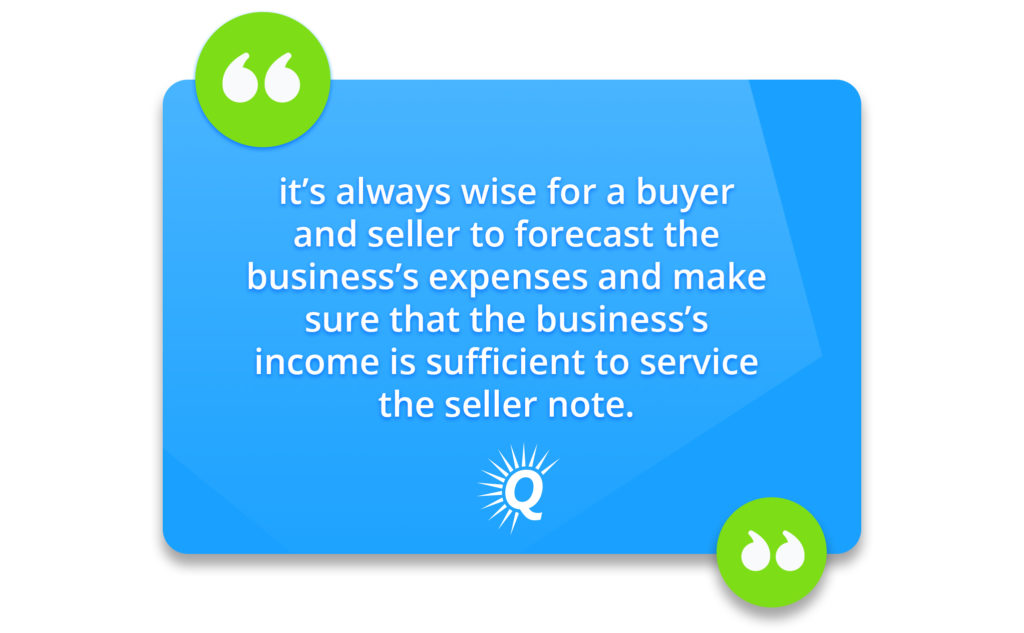

The due diligence process should reveal all the necessary information to determine an appropriate payback ratio.
Keep the payback period short
The longer the note, the greater the chances are that there will be a default. Not only are businesses’ futures uncertain, but if the business begins to struggle early on and there is a long-term debt, it can be tempting for the buyer to default in order to free up short-term cash flow.
Final Thoughts
Almost always, buyers prefer deal structures that allow them to invest less money up front and sellers are generally suspicious of such deals, especially when they don’t know the buyer (which is usually the case).
However, with the right terms, agreement, and some trust, seller financing can create deal opportunities that might otherwise not be possible.
As a seller, being open to owner financing is a great way to attract more buyers, many of whom will be willing to agree to a higher purchase price. While there are certainly drawbacks to seller financing, if conditions are right, it can truly offer a win/win experience for both parties.
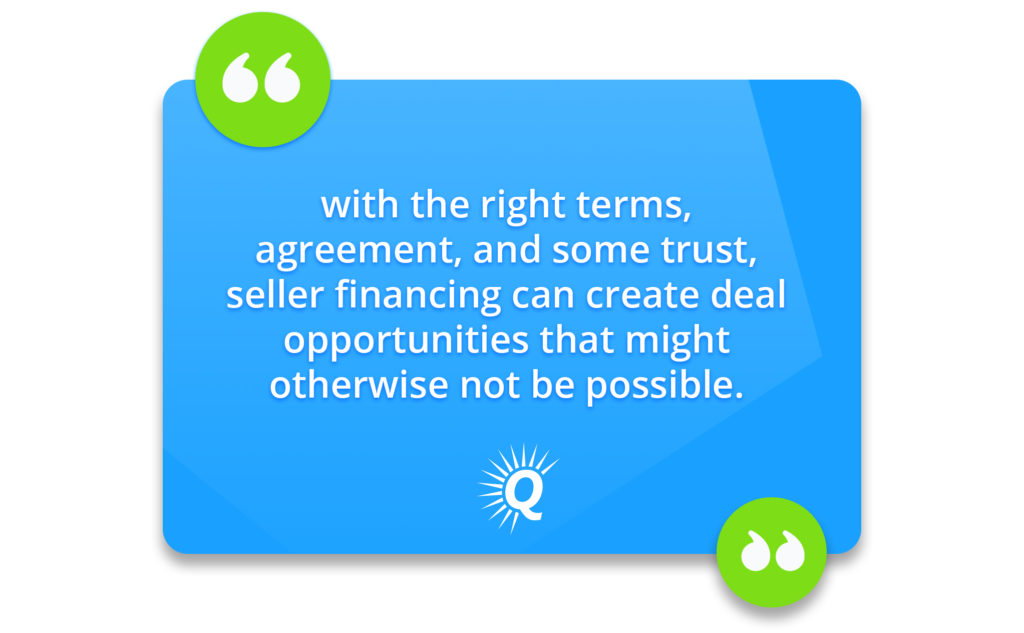

If you’re interested in learning about your options as an owner, feel free to reach out to our team of qualified business advisors for a free consultation. In addition to providing a complimentary valuation of your business, we’ll also be happy to discuss your goals and help you craft the best possible strategy for you and your business.





